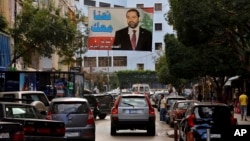In a new twist in the saga of Lebanon's prime minister who resigned over the weekend from Saudi Arabia, Saad Hariri's office said he visited the United Arab Emirates briefly on Tuesday for a meeting with a top official before returning to the kingdom.
Much is unknown about Hariri's unexpected resignation, which stunned the Lebanese, threw its government into disarray and prompted a frenzy of speculation.
One of the rumors is that Hariri has been under house arrest in Saudi Arabia, or in some way forced to do the Saudis' bidding. His brief visit to the UAE could appear to dispel that, except that the Gulf federation is a close Saudi ally - the two countries have been spearheading a war in Yemen since 2015 against the country's Shiite rebels who are backed by Iran.
Abu Dhabi's powerful Crown Prince Mohammed bin Zayed Al Nayhan met Hariri and tweeted a photo, saying they discussed “brotherly ties” and the situation in Lebanon, without elaborating. Hariri's office also said the two discussed the situation in Lebanon.
Meanwhile, Saudi Arabia on Tuesday sent its harshest threat to the Lebanese government, dominated by the Shi'ite militant group Hezbollah, accusing it of declaring war against the kingdom through support that Hezbollah allegedly provides to Yemen's rebels.
Saudi Minister for Gulf Affairs Thamer al-Sabhan said the situation was “very sensitive and worrying” and that the Saudi patience over Hezbollah was running thin.
“The Party of Satan has become a tool of killing and terrorism for the kingdom,” he told the Saudi-owned Al-Arabiya TV, a play on Hezbollah's name, which in Arabic means the Party of God.
Both Hezbollah and the Houthis, as Yemen's Shi'ite rebels are known, have denied any role by the Lebanese group in the war in the Arabian Peninsula country.
“The Party of Satan is represented in the Lebanese government and the government should be aware of such dangers,” Sabhan said. “The Lebanese government will be dealt with as a government that has declared war against the Kingdom of Saudi Arabia.”
Sabhan added that the Lebanese people should be aware of the dangers “before we reach a point of no return.”
In Lebanon, President Michel Aoun held consultations Tuesday with leading politicians over the crisis. Aoun has not called for consultations with parliamentary blocs on the formation of a new Cabinet, saying he will wait until Hariri returns home so that he can hear from him in person about the reasons that made him resign.
Credit ratings agency Moody's warned that Hariri's resignation threatens to disrupt “the fragile political balance in place.” It added that a drawn-out political stalemate less than a month after the government passed its first budget since 2005 “would undermine recent institutional improvements and expose the banking system to a loss in confidence.”
Lebanon's banking sector is the backbone of Lebanon's economy, with assets at $213.4 billion at end-September, according to Byblos Bank, one of the country's largest lenders.
Moody's said any loss of confidence in the banking system or in the stability of Lebanon's institutions, leading to a significant slowdown in private sector deposit inflows or outright outflows, would be credit negative.




